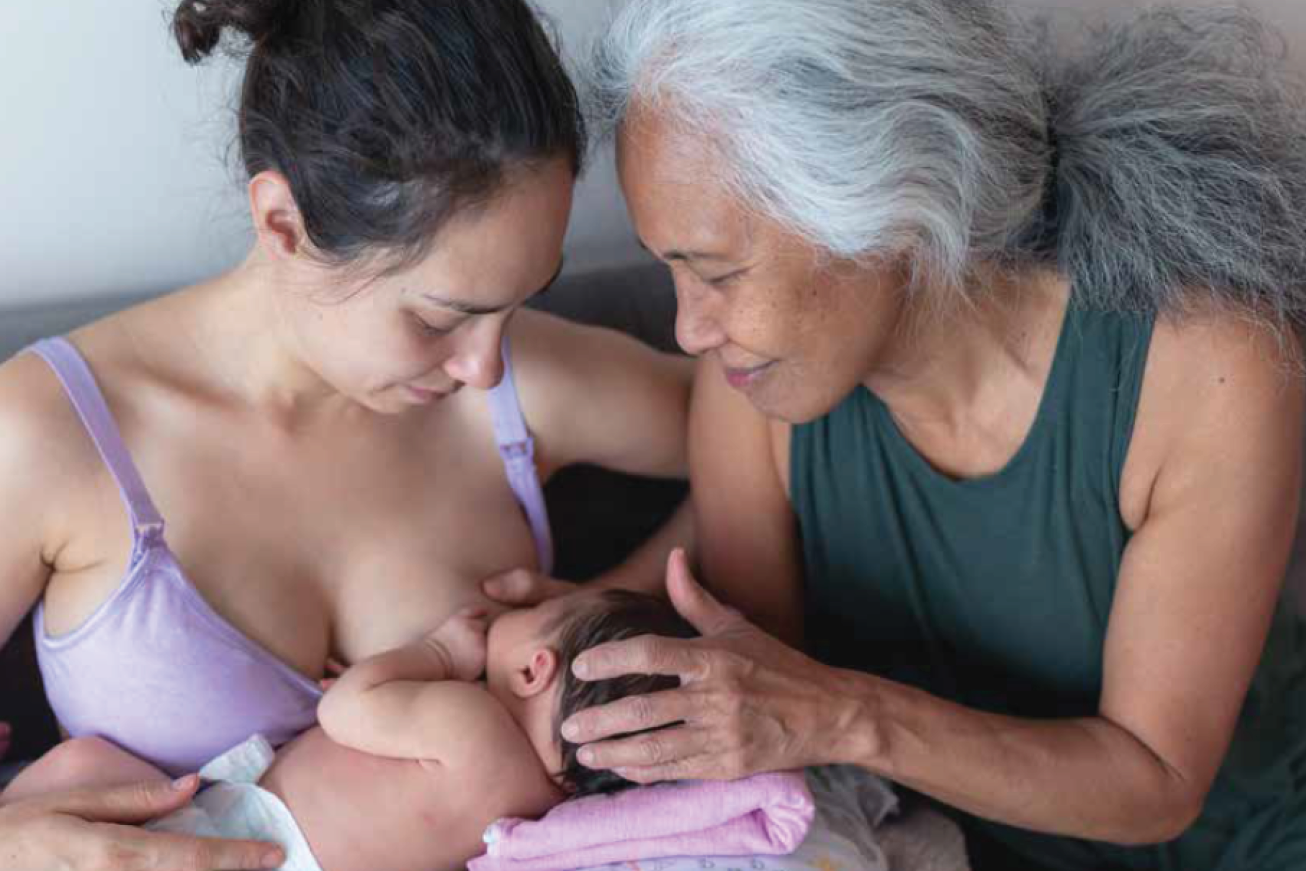
We understand that the first 40 days of baby’s life is a huge transition for both babies and parents alike – the “newborn family” needs to be wrapped in support. This is what “it takes a village” means – support for the family in the early days (and years!). Feeding baby is a big part of the learning process.
How we feed our babies can be an emotive subject for parents, educators and health workers. In short, it’s a delicate topic. Parents Centre recognises breastmilk as the biological norm and we protect and promote breastfeeding in our antenatal courses. We are also fierce advocates for parents to make informed decisions. We all want to do the best we can for our little ones, and we know this can look different for every whānau.
Breastfeeding is an unparalleled way to feed your baby. Here at Parents Centre, we’re big fans of breastmilk – it’s nature at its best! You can read more articles about breastfeeding on our website here: Feeding Baby Archives – Parents Centre Aotearoa Parents Centre Aotearoa And in an era where raising children is so expensive, you can add free to the list of well-documented benefits.[1] We also want to acknowledge the hidden costs as well, e.g. time and the emotional /mental health impact for some parents.
A brief background of formula and the creation of “The Code”
Back in the 1970s, food companies were accused of promoting powdered milk formula for babies in unethical ways. This was particularly concerning in developing countries where parents are faced with specific risks such as access to safe water to make up formula. Promoting formula feeding meant that breastfeeding rates were declining around the world and alongside that, negative health impacts for babies and children as a result of poor infant feeding practices. The World Health Organisation came up with the International Code of Marketing of Breast-Milk Substitutes in 1981, as a response to this. Its objective was to create a “set of recommendations to regulate the marketing of breast-milk substitutes, feeding bottles and teats” 2 This is particularly aimed at not marketing formula for babies under one year of age.
New Zealand adopted the World Health Organization (WHO) International Code in 19833
That means you won’t find us promoting or talking about specific brands of formula. The formula industry is a multibillion dollar one, so it really doesn’t need our help. In her book “Informed is best”, Professor Amy Brown writes about how formula companies use online platforms to circumnavigate these rules around advertising their products. 4 There is also the issue of industry funded research. If only there was as much money to go into support and education around breastfeeding our babies too!
When we talk about breastfeeding success – the opposite of that is not breastfeeding failure of the parent, but rather a failure of a system that does not provide adequately funded support services, a failure of a society that maybe isn’t that breastfeeding friendly. In the words of Dr Brown “You did not fail. No one ‘fails’ to breastfeed. They are failed by a system that fails to support them, both during breastfeeding and when they cannot”. 5
Arguably, the focus on supporting families to understand the importance and benefits of breastfeeding led to formula-feeding taking on an element of shame. Statements like “breast is best” and “fed is best” aren’t really that helpful for people who are navigating these challenges. Sometimes, information and advice about feeding formula to babies was/is not provided to parents who needed or wanted it.
One of our mums told us of her experience, trying everything she could to breastfeed. “After two weeks with a pump, a tube, a syringe and a breastfeeding consultant, I was finally told I wouldn’t be able to breastfeed because I had ‘primary insufficiency’. I was already feeling low, and all I heard was that I was ‘insufficient.’”
Feelings of shame or whakamā really don’t serve anyone. There are some situations that breastfeeding may not be an option for a family – adoption, whāngai, surrogacy, trauma, past surgery, and of course, choice.
So what are the options?
Donor Milk
In some locations, you can now access donor milk banks, where those who produce more milk than their child needs can donate for other babies. Your midwife will know if there is a milk bank in your area, and there is more information here – Donated breast milk
Mixed/Combination feeding:
This is when parents use a combination of breastmilk and formula milk. It’s also important to know that formula feeding can affect your body’s ability to make milk, if you are hoping to both formula feed and breast feed. Every time baby suckles at the breast, a message gets sent from your breast to your brain to both release milk and make more milk. So when baby needs a feed and doesn’t suckle at your breast, your body isn’t getting the message that it needed to make more milk.
If you are thinking about mixed or combination feeding, talk to your Lead Maternity Carer. Every little bit of breastmilk will be beneficial for your baby. Here is a good video from Lactation Consultant Lucy Riddle that contains a lot of great information about this option:
Combination Feeding – Womens Health Action
Formula in Aotearoa
Here in Aotearoa New Zealand, we have access to safe drinking water almost everywhere in the country, and strict standards for manufacturing of baby formula, so all formula’s meet that standard.
A formula-fed baby in New Zealand is going to receive adequate nutrition, so long as the package instructions are accurately followed.
Although because we live in Aotearoa, no stranger to earthquakes, cyclones and floods, its important to note that emergency situations may put safety at risk. In emergencies such as these, water supply is often compromised, and breastfeeding is always recommended to make sure baby is safe.
What do you need to know about formula-feeding?
If you can’t or choose not to breastfeed, the Ministry of Health advises that infant formula is the recommended alternative to breastmilk for babies under 1 year of age. When your baby turns one, they don’t need to have a special toddler formula, they can switch to a full fat milk cow’s milk. Soy milk fortified with calcium and vitamin B12 is recommended for toddlers over 12 months who need an alternative to cow’s milk 6 .
If you choose to formula feed your baby, here are some key things to understand:
- Responsive feeding – regardless of if you are breast or bottle feeding your baby, it’s really important to watch your baby for the cues they are giving us and stopping when they are full. Responsive feeding acknowledges that babies aren’t just getting food when they are being fed, they are being held close by the loving adult in their life, feeling comforted, safe and secure 7
- Paced bottle feeding is a good technique to utilize when/if you’re feeding your baby with a bottle. It lets baby drink at a slower pace and take breaks when they need too. You can watch a short video about paced bottle feeding here How to Bottle Feed your Baby: Paced Bottle Feeding (youtube.com) . You’ll note from the video that slow flow teats are also beneficial when bottle feeding.
- Safely preparing formula: Health New Zealand has comprehensive information about formula feeding here Infant formula feeding (info.health.nz).
It’s important to follow the exact direction on the container and sterilise your equipment thoroughly for safe preparation of formula.
We recommend you talk to your Lead Maternity Carer about your options to make an informed decision that is right for you.
Here at Parents Centre Aotearoa, we know that it’s possible to promote breastfeeding and advocate for those who wish to breastfeed, while making sure that whānau who formula-feed also feel supported.
[1] Te ngote ū | Breastfeeding | Te Whatu Ora (adhb.govt.nz)
2 9789241594295_eng.pdf (who.int)
3 Questions and answers about the WHO Code in New Zealand | Ministry of Health NZ
4 Brown, Dr Amy. (2019). Informed is best. Printer & Martin Ltd.
5 Brown, Dr Amy. (2021). Why breastfeeding grief and trauma matter. Printer & Martin Ltd.
6 Healthy eating guidelines for babies: when can your baby drink cow’s milk? | Ministry of Health NZ
7 Infant feeding – New Zealand College of Midwives – New Zealand College of Midwives (midwife.org.nz)





